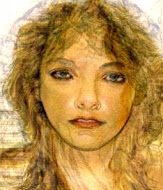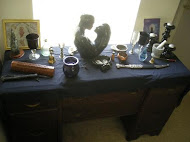You think you'd like to cast a spell, but you're afraid . . . Is practicing magic evil?
According to general worldwide metaphysical wisdom, magic is a source of power. Power may be used benevolently or selfishly, with varying degrees of mal intent. Thus it isn't the abstract practice of magic that is either good or bad; it's what each practitioner chooses to do with it. Responsibility for one's actions and the consequences that stem from them rest securely on the individual practitioner's shoulders. Have evil people ever abused magic power? Sure. Just take a look at some of the hexes in this book, Is magic the only power capable of being a-bused? Of course not. How about financial power, political power, brute strength, nuclear power, and so on and so forth?
There is a general rule, accepted across the board, that magicians reap what they sow. Cast an evil spell - ultimately receive evil back. Negative efforts attract neg-ative returns, at a return rate of three-, seven-, or nine-fold. The standard rule of witchcraft is do what thou will, but harm none. Many modern witches are abso-lutely terrified of transgressing that rule.
So then, why magic's bad reputation?
Yes, there are legends of wicked sorcerers using their skills to hold others in thrall. However, if one examines these legends closely, it's usually revealed that the ma-gical aspect is but a smoke screen for more reliable, conventional methods of co-ercion, like brute force and access to greater wealth, although I suppose one could argue that magical prowess enabled their acquisition. Suffice to say that any po-sition of power in any profession, is vulnerable to corruption and temptation. Let's talk about the average working magical practitioner.
Magic is concerned with the immediate needs and desires of the practitioner in the here and now, or at least in the immediately foreseeable future. It is not about "pie in the sky." The average magician doesn't want to wait for the possible rewards of the sweet hereafter. Magic is not for the passive; if you're willing to passively ac-cede to your fate, the destiny others decide for you, whatever it is, why waste time, effort or money casting a spell?
Magic recognizes that Earth is full of gifts and the practitioner wants his or her share now. Magic is not the same as religion, although many religions have histor-ically incorporated magic into their practice, and still do. To put it mildly, magic is mot an inherently reverential system. Magic demands that my will be done, not necessarily thine - or at least, let's find a compromise. It is not a humble art. Ma-gic possesses an intensely powerful independent, egalitarian streak.
An infinite quantity of magic power exists in the world, enough for everyone, It's not like a scarce commodity, where if I have it, you don't. Magic power is con-stantly being generated, although various modern practices, especially those that affect the natural environment, have diminished present quantities drastically. Similar to Pullman's His Dark Materials dust, the energy that each individual gen-erates enters the universe where it affects, and may be drawn upon by, others. It is to everyone's benefit (except perhaps for that elite few already achieving their heaven on Earth at the expense of others) that every individual, creature or thing, maximizes its potential for power.
Furthermore, not all powers on Earth are positive: intense extended misery, suf-fering and oppression generate a negative energy that ultimately affects everyone badly, diminishes baraka, obstructs magic power and limits everyone's access to it. In addition, the extinction of Earth's life forms - the loss of plant and animal spe-cies - eliminates every practitioner's potential access to their unique powers. Thus general oppression and certain policies affecting the environment, beyond any ethical considerations of right or wrong, hamper the magician's ability to maximize personal power and the power of their spells.
There is an inherent tension between the individual practitioner seeking power, and authority of all kinds, most especially religious authority, which seeks to maintain its authority by retaining and controlling access to the divine, as well as to tools, theology and ritual. Religion frequently seeks to establish rules and boundaries about who has direct access to the divine, and who bestows that access and the proper channels. Correct methods of worship and spiritual communication are prescribed, including what is permitted and what is not.
If something has power, magicians usually want to try it out, regardless of whose tradition or faith it comes from, regardless of whether some authority says use is forbidden. Although magic is a conservative force in ways, harking back to hu-manity's most primal arts, it also evolves endlessly, adapting new material, new traditions and new methods as they appear. It is fluid and defiant and resists control.
Fundamentalists of all kinds are inevitably opposed to magic, but this tension exists even among liberal faiths that prize their magical traditions - so-called magical religions. Here, inevitably, religious tradition stipulates a right way to practice magic. Knowledge may be reserved for the few, with methods reserved for those going through the proper, authorized channels. Tension will exist between the officially initiated and independent practitioners.
That tension between authority and magical practitioner is, I suspect, the real reason why secular rulers and religious authorities (frequently in conjunction with each other) attempt to brand magic and its practitioners as evil influences, a cancer among the submissive. Lack of obedience rather than lack of morality is what really draws down the wrath of authority.
It is no accident that the Bible records that Israel's diviners, shamans and necro-mancers were "put away" during the reign of its very first king, Saul. When the prophet Samuel warned the children of Israel that choosing a king would mean losing sons, daughters, land and livestock, he neglected to mention that they would also lose their previous access to professional magical advice. Or perhaps he didn't bother to mention it because he was aware, as apparently was the king, that those magical services are so crucial that they are never entirely suppressed. In fact, King Saul himself is very soon shown, in his hour of need, searching out one of those prescribed, forbidden bone-conjurers for a private consultation.
Because the Bible has so often been used as an excuse to persecute and extermin-ate witches, it's significant to note how the Bible depicts the Witch of Endor act-ually accomplishing her task. She's not painted as a stranger with strange talents, or as a foreigner, but as a member of the community. Neither is she shown to be a fraud; she capably fulfills her royal client's request. Nor is she depicted as ma-levolent or evil, but as a good-hearted woman: having accomplished the unhappy task that every fortune teller dreads, of delivering really bad news, she comforts and feeds the distraught king, providing his last meal on Earth, at personal sac-rifice (she kills a calf to feed him) considering that he is responsible for her loss of profession and presumably income.
Fortune-tellers, readers and diviners hold an especially tense relationship with po-litical authority. Historically, rulers, particularly the all-powerful, very much like to have the future revealed. They also typically wish to retain exclusive control over this information. Because others may use a diviners skill to plot rebellion, histor-ically diviners have been imprisoned, or one is imprisoned for the ruler's private use, while others are killed. To make matters worse, rulers usually desire to hear only the future as they envision it; a diviner can only read what entrails, shoulder blades, or other tools reveal. You see the need sometimes to keep one's power secret. Although it frustrates us today, there's a very good reason Nostradamus recorded his prophesies in code.
Wherever efforts have been made either to subjugate or convert another country or people, among the first acts traditionally taken is the attempted subversion or elimination of native shamans and traditional magical practices and practitioners. This is inevitably perceived as necessity for the pacification of the masses. This is not purely paranoia on the part of those seeking to assert and retain authority.
Traditional shamans and magical practitioners are consistently in the forefront of resistance to oppressive authority. (Because winners write history, the con-ventional historical explanation for this phenomenon is that shamans attempt to impede the "path of progress." ) In the British West Indies, historical records show that Obeah men and women (the local shamans) led slave revolts or attempted to do so. The Haitian revolution, which ended slavery in that French colony and estab-lished the first independent black republic in the Western Hemisphere, was inaug-urated at a Vodoun ceremony dedicated to the Spirit of Iron, the material, with the sole exception of menstrual blood, singularly most charged with magical power - although as soon as native dictators proceeded to seize and consolidate power, not surprisingly, they too attempted to restrict or eliminate Vodoun.
This, not evil, power-hungry sorcerers is the hidden history of magic. In the United States, the prominent Voodooists Marie Laveau and Mary Ellen Pleasant rescued and redeemed slaves, with Pleasant providing funding for John Brown's raid on Harper's Ferry. (Their male counterpart, Dr John Montanet, was himself a freed slave, as was Pleasant.) Lest you think this association between magic and social justice is limited to African influence, Native American shamans were (and remain) in the forefront of resistance to white encroachment, and traditional practitioners led desperate resistance to Christian domination of Europe. Who knows what at-tempts to defy limitations on women's magical and spiritual traditions were de-stroyed in the flames of the craze of medieval witch-burning? Virtually all the re-cords that remain are filtered through the eyes of the torturers.
Although men suffer too, societies that suppress the magical arts will, as a rule, also limit women's voices and power, often with terrible brutality. Significantly, King Saul, in need of a necromancer, requested that his minions find him a conjuring woman. Although it's since taken many twists and turns, magic ultimately derives from women's mysteries and the mysteries of creation, and the history of magic's suppression cannot be separated from the history of women's oppression.
Is magic evil? Well, if your perception is that sex is inherently evil, Creation inher-ently tainted with sin, and that women constitute Earth's weakest link. then I guess you'd better lump magic in there with the rest of these moral dilemmas.
If magic cannot be entirely divorced from religion, even less can it be separated from herbalism, the root of all traditional medicinal systems, systems that for mil-lennia have investigated botanical impact on health and (above all) on repro-duction. Magic is the primordial human art and science. It stems from awe inspired by all Earthly creation, but especially the mysteries of human creation. Every new human life is the ultimate act of magic. Conscious attempts at conception pro-bably constitute the first magic spells, especially if you consider that our remote ancestors didn't understand pregnancy in the detached, technical manner that we do today. Primordial religions venerated the divine in the form of human genitalia with joy, awe and respect, not prurience, recognizing their capacity for sacred generation and creation.
Although these symbols still survive in isolated pockets of official religion, magic remains suffused with sexual imagery, in ways that may surprise us today, in ef-forts to maximize the blessings inherent in the powers of anatomy, both male and female. However, magic stems from fascination, on the parts of both women and men, with women's mysteries : the capacity to produce life where it didn't exist before, magic blood that flows on schedule from no wound and then is myster-iously retained, the links between that blood, fertility, women, the moon and the sea. These were and remain conduits to the sacred for primordial magic and spirituality alike.
TAKEN IN ENTIRETY FROM THE ELEMENT ENCYCLOPEDIA OF 5000 SPELLS BY JUDIKA ILLES
Disclaimer: No one involved in this blog or its contents may be held responsible for any adverse reactions arising from following any of the instructions/recipes on this list. It is the reader's personal responsibility to exercise all precautions and use his or her own discretion if following any instructions or advice from this blog.















No comments:
Post a Comment